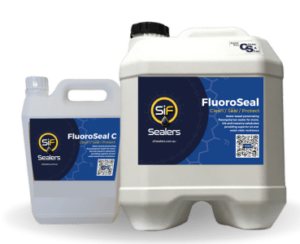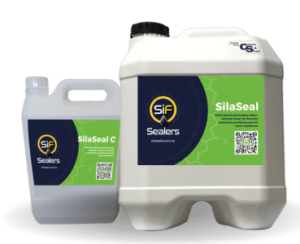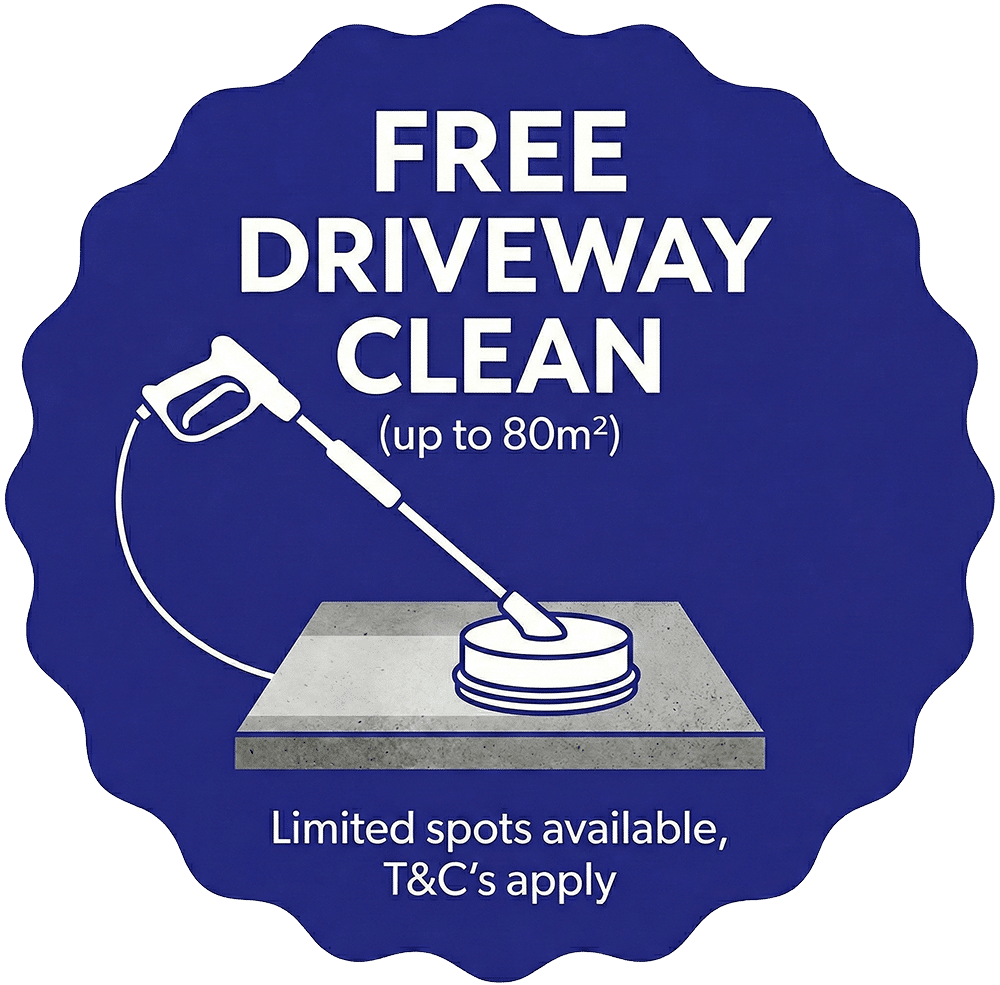Noticed your blacktop driveway looking worse for wear? That cracking, fading surface doesn’t have to stay that way.
Think of driveway sealing as the shield that stands between your pavement and everything trying to destroy it. Sealcoating creates a protective barrier against water, UV rays, and harmful chemicals that can deteriorate asphalt over time. This maintenance process shields your driveway from sun damage, rain, and freeze-thaw cycles, ultimately extending its lifespan and saving you money on costly repairs. The right driveway sealant preserves your pavement’s integrity while enhancing its appearance, maintaining your property’s curb appeal and value.
The big question you’ll have to answer is: Are you capable of handling this project yourself, or should you bring in the professionals? DIY sealing offers potential cost savings, but professional application brings expertise and potentially superior results. Understanding how much to seal a driveway, drying times, and the specific considerations for different pavement types all factor into making the right choice.
We’ve put together everything you need to know about both approaches – the costs, the challenges, and the results you can expect. This guide will help you determine which driveway sealer approach makes sense for your specific situation.
Why Sealing Your Driveway is so Important
Your driveway represents a significant investment that deserves proper protection. Applying a quality driveway sealer creates a protective barrier that shields your concrete or asphalt from various threats that would otherwise accelerate deterioration.
Protects against weather and wear
Australia’s harsh climate takes a severe toll on exposed concrete surfaces. A proper driveway sealant acts as a shield against multiple environmental threats. Water penetration poses the most critical risk – when water seeps into cracks and expands during temperature drops, it causes further damage.
UV rays present another serious concern. The sun deteriorates your concrete driveway at an accelerated rate through oxidation. Without protection, solar exposure weakens and shifts the driveway’s structure, compromising both stability and durability. A quality sealer blocks these harmful rays, preventing premature aging.
Sealed driveways offer superior resistance against:
- Oil, gasoline, and chemical spills that stain and weaken surfaces
- Freeze-thaw cycles cause expansion and contraction
- Heavy rain that erodes the underlying base
- Heat that makes asphalt brittle over time
The sealer essentially fills concrete’s natural pores, creating a barrier that repels damaging elements. This protection becomes particularly crucial for driveways in areas exposed to intense sunlight or severe weather conditions.
Improves appearance and curb appeal
Sealing dramatically enhances your driveway’s visual appeal beyond mere protection. The application creates a smooth, uniform colour that makes your driveway look refreshed and well-maintained. For concrete driveways specifically, sealing amplifies aesthetic appeal by lending a more elegant and refined appearance.
The impact on property value shouldn’t be underestimated. Industry experts indicate that an attractive driveway can affect property value, potentially raising a home’s worth by up to 14%. This makes driveway sealing one of the most cost-effective methods to enhance curb appeal.
You can choose from various finishes—gloss, no-gloss, satin, or matte—to achieve your desired appearance. The result smooths over imperfections, giving your home’s entrance a fresh and appealing look.
Extends the life of your driveway
Regular maintenance through sealing can help your driveway last decades rather than years. Experts generally recommend sealing concrete driveways every two to three years for maximum protection.
The economics make sealing a wise investment. Compare the cost of regular sealing against complete replacement – the difference is substantial. Regular sealing prevents small issues from becoming major problems requiring costly repairs or total replacement.
A sealed driveway maintains flexibility longer, slowing the progression to brittleness that comes with age and constant traffic. This preserves structural integrity, especially important in areas prone to freeze-thaw cycles.
Regular driveway sealing protects your property, enhances appearance, and saves money long-term.
DIY Driveway Sealing: Pros and Cons
Taking on driveway sealing yourself appeals to many Australian homeowners who want to maintain their property while controlling costs. Before you commit to a weekend project, it’s worth examining what you’re signing up for.
Cost savings and scheduling control
Money talks when it comes to DIY projects. Handle the job yourself and you’ll save approximately AUD 305.80 in labour costs compared to hiring professionals. Materials for a quality asphalt driveway sealer typically cost around AUD 152.90, making your total investment substantially lower than professional services.
The scheduling flexibility proves equally attractive. You choose exactly when to complete the project based on your calendar rather than working around a contractor’s availability. This control extends to product selection—you can research and select specific sealants that align with your preferences and driveway needs.
Many homeowners report genuine satisfaction from completing their driveway sealing projects. This hands-on experience also provides valuable insight into your property’s maintenance requirements, knowledge that serves you well for future upkeep decisions.
Equipment requirements and skill demands
DIY sealing requires specific tools and techniques that many homeowners underestimate. You’ll need a squeegee or application brush, broom, drill, mixing paddle, duct tape, and poly sheeting to protect surrounding surfaces. Concrete driveways demand different applicators—typically a broom applicator versus a squeegee for asphalt.
The learning curve creates real risks. Common mistakes that can compromise your results include:
- Insufficient surface cleaning prevents proper adhesion
- Improper stirring of sealant materials
- Using incorrect application tools
- Inadequate drying time between coats
- Applying sealant too frequently, causing it to flake off
Weather adds another complication. You need at least two consecutive dry days with temperatures above 50 degrees Fahrenheit (10°C). Extremely hot days cause the sealer to dry too quickly, while rain washes away your investment entirely.
The time commitment is substantial. Preparation alone takes a full day, including drying time, with application requiring several hours per coat. Most manufacturers recommend two coats with a minimum of eight hours drying time between applications—meaning your DIY project will likely consume an entire weekend.
Health hazards and environmental responsibilities
Driveway sealants contain chemicals that pose genuine health risks. Many products include volatile organic compounds and other substances harmful if inhaled. Professional-grade respiratory protection (P100 masks) becomes essential during application.
Environmental concerns present even more serious considerations. Coal tar-based sealants—commonly available for DIY use—contain polycyclic aromatic hydrocarbons (PAHs) that increase cancer risk for residents near sealed surfaces. These chemicals track into homes or wash into waterways, creating toxic conditions for aquatic life. Studies show that runoff from coal tar-sealed pavement killed 100% of tested aquatic creatures within 42 days.
Better alternatives exist. Asphalt-based sealers contain approximately 1,000 times fewer PAHs than coal tar options, while bio-based sealants offer even more environmentally responsible choices.
Improper application or disposal of materials can breach environmental regulations, creating additional legal responsibility for DIY homeowners. This isn’t just about protecting your driveway—it’s about protecting your community and local environment.
Professional Driveway Sealing: Pros and Cons
Bringing in professional contractors for driveway sealing delivers specialised expertise that can make a significant difference in your final results. Let’s examine what contractors bring to the table versus handling the project yourself.


Expertise and high-quality results
Professional contractors assess your driveway’s specific condition and create tailored solutions based on their evaluation. This personalised approach ensures unique issues receive appropriate treatment. Professionals also access high-grade commercial sealants that aren’t typically available to consumers, delivering more durable protection.
Application quality stands out as another major advantage. Contractors possess the equipment to apply sealant evenly, creating a uniform finish that enhances your driveway’s appearance. Many professionals offer warranties on their work, providing peace of mind that DIY approaches simply cannot match.
Time efficiency represents an often overlooked benefit—professional teams typically complete a driveway sealing project in a single day, compared to the multiple days required for DIY approaches. This saves you from physical labour and cleanup responsibilities.
Cost considerations and scheduling constraints
The primary drawback involves higher upfront costs. Professional driveway sealing services include labour fees, material costs, and equipment expenses. Many contractors set minimum service fees ranging from AUD 152.90 to AUD 305.80, which might seem steep for smaller driveways.
Scheduling dependence presents another consideration. You’ll need to coordinate with the contractor’s availability, which may not align perfectly with your preferred timeline. This becomes especially important since driveway sealing requires specific weather conditions to cure properly.
Finding a reliable contractor
To identify trustworthy professionals, request quotes from at least three local contractors. This comparison helps evaluate not just pricing but also the scope of services each offers.
Essential questions to ask potential contractors:
- Are you fully licensed and insured?
- How many years of experience do you have with driveway sealing?
- Can you provide references or examples from past projects?
- What types of sealant do you recommend for my specific situation?
- What preparation is needed before sealing?
- Do you offer a warranty or guarantee on your work?
Customer feedback provides valuable insight into a contractor’s reputation. Look for consistent positive reviews, detailed feedback, and high ratings when evaluating potential contractors.
Note: Professional application often delivers superior long-term value through extended protection and reduced repair needs—despite the higher initial investment.
Cost, Time, and Effort Comparison
Making the right choice between DIY and professional driveway sealing comes down to the numbers. Here’s what you can expect to invest in both time and money with each approach.
How much to seal a driveway yourself
DIY sealing delivers noticeable upfront savings. Materials for a typical driveway sealing project cost approximately AUD 152.90, allowing you to save around AUD 305.80 in labour costs compared to hiring professionals. For asphalt driveways, you can expect to pay between AUD 0.09 to AUD 0.58 per square foot for sealant.
Your DIY Budget Breakdown:
- Sealant (5-gallon buckets covering up to 400 square feet)
- Crack filler (AUD 0.15 to AUD 0.23 per linear foot)
- Application tools (squeegees, brushes, protective equipment)
- Cleaning supplies for preparation
The catch? You may need to purchase specialised equipment that professionals already own. Many contractors charge a minimum service fee between AUD 152.90 and AUD 305.80, so for very small driveways, the cost difference becomes less significant.
What professionals typically charge
Professional driveway sealing in Australia runs between AUD 15.29 to AUD 53.51 per square meter. The price varies based on your location, driveway size, and current condition.
Typical Professional Costs:
- AUD 917.39 for a small single-car driveway (up to 30m²)
- AUD 5,351.47 or more for a large double-car driveway (up to 100m²)
Labour costs average around AUD 1.76 per square foot, with additional charges potentially including:
- Travel fees and equipment usage
- Surface preparation and cleaning
- Crack filling if required
- Application of primer for certain sealer types
Smaller driveways often cost more per square meter due to fixed costs being spread across less area. Professional services normally include a warranty backing their work, providing additional value beyond the initial service.
Time investment for both options
The time commitment differs substantially between approaches. DIY projects require:
- One full day for preparation, including cleaning and drying time
- Several hours per coat for application
- 8+ hours drying time between coats (most manufacturers recommend two coats)
- 24-48 hours before driving or walking on the newly sealed surface
A DIY project typically consumes an entire weekend, whereas professional teams can often complete the entire job in a single day.
DIY projects also require additional planning—you’ll need to schedule around weather forecasts, ensuring at least three consecutive days without rain and temperatures between 10-35°C.
How to Decide What’s Right for You
Now that you understand both approaches, how do you choose? The right decision depends on your specific circumstances rather than a one-size-fits-all answer.
Consider your budget and time
Budget considerations go beyond just upfront costs. Are you focused on immediate savings, or do you value long-term results? DIY approaches require less initial investment, but professional application might prove more economical over time through superior durability.
Your timeline matters just as much. Ask yourself:
- Do you have a full weekend available for project completion?
- Can you accommodate weather delays if necessary?
- Is immediate completion essential, or can you wait for a professional’s availability?
Evaluate your skill level
Here’s where honest self-assessment becomes crucial. Do you have experience with similar maintenance tasks? Are you comfortable handling chemical products safely?
Remember that improper application might require costly corrections later. For those with physical limitations, the labour-intensive nature of driveway sealing—extensive cleaning, crack filling, and multiple application coats—may prove challenging. Sometimes hiring professionals is worth the additional expense.
Think about the size and condition of your driveway
Your driveway’s physical characteristics should heavily influence your decision. Larger driveways require more time and materials, potentially making professional services more attractive. Driveways with extensive damage, numerous cracks, or significant oil stains benefit from professional expertise.
Complex layouts with curves, slopes, or decorative elements present technical challenges that professionals handle routinely. Smaller, relatively flat driveways in good condition? These are ideal candidates for DIY projects.
The key is matching your choice to your capabilities and circumstances—both approaches effectively protect your investment when executed properly.
Conclusion
The choice between DIY and professional driveway sealing comes down to your specific circumstances and priorities. DIY sealing offers cost savings and scheduling flexibility, though it demands proper tools, techniques, and safety precautions. Professional application costs more upfront but delivers expert results with time efficiency and often includes warranties for peace of mind.
Sealing your driveway remains essential regardless of which path you choose. A properly sealed driveway shields against weather damage, enhances your property’s appearance, and significantly extends the pavement’s lifespan. The right decision balances your financial constraints against professional expertise and your comfort with handling the project yourself.
Before making your final choice, honestly assess your abilities, available time, and your driveway’s condition. Smaller, well-maintained driveways make perfect candidates for DIY projects, while larger or damaged surfaces benefit from professional attention. Consider the long-term value rather than just immediate cost—quality application, whether by your hand or a contractor’s, will protect your driveway for years to come, maintaining both its function and your property’s curb appeal.
Key Takeaways
Understanding the trade-offs between DIY and professional driveway sealing helps you make the best choice for your property’s protection and your budget.
- DIY sealing saves approximately AUD 305.80 in labour costs but requires proper tools, safety equipment, and a full weekend commitment
- Professional services cost AUD 15.29-53.51 per square meter but deliver expert application, warranties, and completion in one day
- Driveway sealing extends pavement life by decades, protects against weather damage, and can increase property value by up to 14%
- Choose DIY for smaller, well-maintained driveways if you have experience; opt for professionals for large, damaged, or complex surfaces
- Regular sealing every 2-3 years prevents costly repairs and maintains your driveway’s appearance and structural integrity
The key is matching your choice to your skill level, available time, and driveway condition—both approaches effectively protect your investment when executed properly.
FAQs
Is it more cost-effective to seal my driveway myself or hire a professional? DIY sealing can save you around AUD 305.80 in labour costs, with materials costing about AUD 152.90. However, professional sealing, while more expensive upfront (AUD 15.29-53.51 per square meter), often provides better long-term value through superior materials and application techniques.
How do I choose the right driveway sealer? Consider factors such as your climate, desired level of protection, and aesthetic preferences. Asphalt emulsion sealers are popular for residential use, balancing affordability and eco-friendliness. For high-traffic areas, more durable options like fast-dry sealers might be preferable.
How often should I seal my driveway? Experts generally recommend sealing a concrete driveway every two to three years for maximum protection. Regular sealing helps prevent small issues from becoming major problems and can significantly extend your driveway’s lifespan.
What are the main benefits of sealing my driveway? Sealing your driveway protects it against weather damage, UV rays, and chemical spills. It also improves appearance, potentially increasing your property value by up to 14%. Additionally, regular sealing can extend your driveway’s life by decades, saving you money on repairs and replacement.
What should I consider when deciding between DIY and professional driveway sealing? Evaluate your budget, available time, skill level, and driveway condition. DIY is suitable for smaller, well-maintained driveways if you have experience and a full weekend to spare. Professional services are better for larger, damaged, or complex surfaces, offering expertise, time efficiency, and often warranties.

